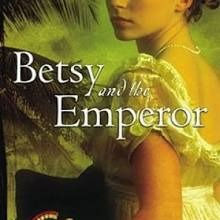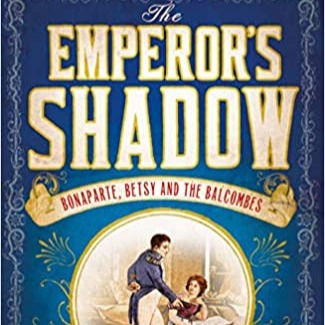5 May 1821: Napoleon Bonaparte, former ruler of France, dies in exile on St. Helena

Betsy and the Emperor by Staton Rabin
Novel/Biographical
311 pages
Publisher: Simon Pulse
Recommended for: Dialectic students
Napoleon, one of history's most audacious men, fought for--and later crowned himself emperor of--France, he always saw himself as Corsican. He was descended from a noble Tuscan family that were exiled to Corsica in the 16th century but grew up in fairly humble fashion in the home of his father, a local lawyer who always managed to come out on top of the many Corsican imbroglios in which he became embroiled. This was a trait his son would share.
Educated in military schools in France, Napoleon would enter the French army as an artillery officer. Twice, he attempted to join a Corsican group his father had been a part of but was rebuffed by its leader, who saw Napoleon as French. Later, he would attempt an unsuccessful coup of the group, resulting in his entire family's banishment from the island. Upon his return to France, he would become associated with the Jacobins, whose radical ideologies would lead to the Reign of Terror. Leading the National Convention's troops in a decisive, victorious battle against the British at Toulon would see Napoleon, then only 24, promoted to brigadier general. Praise about him to the leader of the government, Maximilien Robespierre, would result in an appointment as commandant of artillery in the French fight in Italy.
When Robespierre fell, Napoleon was arrested as a conspirator but managed to avoid a guilty charge. His career stalled, however, as he was seen as too ambitious and was not trusted. When push came to shove, Napoleon was brought in and saved the day in October of 1795, when rebel royalists marched on the National Convention. He is credited with saving the republic and given command of the army of the interior. He was 26 years old.
Napoleon would go on to win glory in Italy against the Austrians, where in addition to his flair on the battlefield he showed an adeptness in matters of government. He was sent on to British controlled Egypt, where he met with success but provoked battle with the Turks, who held some power over Egypt. Napoleon attempted to press on against the Turks but suffered a humiliating defeat at Acre. The French had also been winning wars on the home front, so that it was a militarily strong country that Napoleon returned to in late 1799 and launched his coup.
Napoleon would rule in France, first as co-consul, then first consul, and finally as self-crowned emperor, from 1799-1814. He was very much a man of the Enlightenment and used his extensive reading to enact reforms--all of which were at the will of the army, which he believed necessary to strength in any endeavor. Some things, such as the constitution he and his co-consuls gave the country were really just a front for his dictatorship, as it awarded first consul great power. Napoleon also enacted reforms in the judiciary, economy, and administration. He was also instrumental in bringing the Catholic faith back to France by making peace with Pope Pius VII.
Three things ultimately led to his downfall: his desire to invade Britain and a failed naval blockade to that end, his campaign against the Spanish, and his disastrous march for Moscow in an attempt to take control of Russia. In April of 1814, the French government--behind Napoleon's back--treated with the British and their allies, and Napoleon was forced to abdicate. He was granted very loose imprisonment on the isle of Elba, from which he escaped and returned to France, ruling once again for one hundred days, from 15 March to 22 June. After a bloody, disastrous battle against the British at Waterloo. he was once again forced to abdicate and exiled to the remote Atlantic island of St. Helena.
It was on St. Helena that Napoleon befriended the thirteen year old Lucia Elizabeth "Betsy" Balcombe. The lively Betsy brought light into the bored former emperor's final years. She went on to write a short memoir about their years together, from 1815 until Napoleon's death from stomach cancer in 1821. The book is out of print and difficult to find but is well worth the time if you can find a copy.

A nonfiction source is The Emperor's Shadow: Bonaparte, Betsy, and the Balcombes of St. Helena by Anna Whitehead. This book is a biography of Betsy, but a fair amount about Napoleon is learned, as the years of her friendship with him influenced and impacted her future in many ways. The book can still be found for reasonable sums online.

A very good option for Rhetoric students is Napoleon's Last Island: A Novel, written by the wonderful historical fiction writer, Thomas Keneally (best known for his novel, Schindler's Ark, later rereleased under its better-known movie title, Schindler's List).

Comments